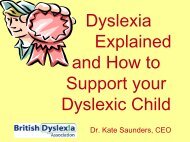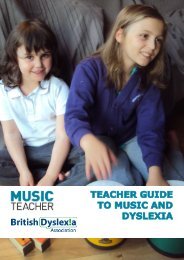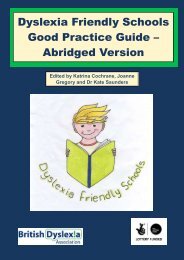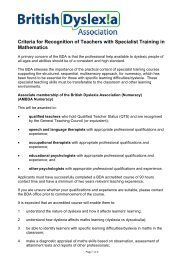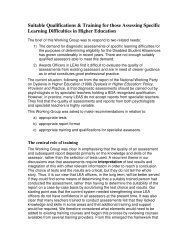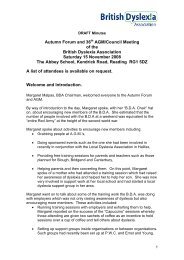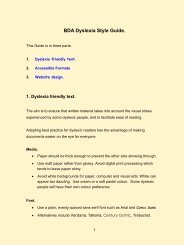Intervention for Dyslexia - The British Dyslexia Association
Intervention for Dyslexia - The British Dyslexia Association
Intervention for Dyslexia - The British Dyslexia Association
You also want an ePaper? Increase the reach of your titles
YUMPU automatically turns print PDFs into web optimized ePapers that Google loves.
instruction in phonics, it cannot be claimed that such phonics teaching is<br />
systematic or comprehensive.<br />
35) International reviews of Reading Recovery have mostly been positive, concluding<br />
that, although costly, Reading Recovery generally resulted in significant gains in<br />
reading. It has also been noted that it was less effective in maintaining those<br />
gains and it would be an unwise strategy to shift all resources <strong>for</strong> remediation<br />
into Reading Recovery because some students would be likely to require<br />
additional or continuing support.<br />
36) Independent research studies show benefits <strong>for</strong> many children on Reading<br />
Recovery programmes. However, comparisons of the ratio gains made by<br />
children in Reading Recovery and in systematic phonologically based<br />
interventions appear on balance to favour the latter.<br />
37) Since 2005, the Every Child a Reader initiative (ECaR) has been providing<br />
Reading Recovery within a broader programme to increasing numbers of Year 1<br />
pupils in England. <strong>The</strong> ECaR annual reports show that about 85% of enrolled<br />
children successfully complete the programme and are raised to at least the<br />
average reading level of their class. Over a third of these pupils, who, when they<br />
started the programme, were among the lowest achievers in their classes,<br />
progress to achieving Level 2b (the national target level) or better in Key Stage 1<br />
National Curriculum assessments in reading. A quasi-experimental study in<br />
London has provided further support <strong>for</strong> the approach.<br />
38) Analysis of National Curriculum assessment results of children on Reading<br />
Recovery programmes over the period 2003–2007 does not support the view<br />
that Reading Recovery in England and Wales achieves its stated goal <strong>for</strong><br />
“children to develop effective reading and writing strategies in order to work<br />
within an average range of classroom per<strong>for</strong>mance”. Only 12%–15% of Reading<br />
Recovery children completing their programmes between 2003 and 2007<br />
achieved a Level 2a or above in Key Stage 1 Reading National Curriculum<br />
assessments, the level at which children can tackle unfamiliar words and have<br />
there<strong>for</strong>e developed a self-sustaining word recognition system.<br />
39) Literature searches failed to uncover any published evaluations of Reading<br />
Recovery being used with dyslexic pupils. To decide the question whether<br />
Reading Recovery actually works <strong>for</strong> children with dyslexia there<strong>for</strong>e requires<br />
further research. However, dyslexic children, by definition, have specific<br />
problems in acquiring effective knowledge of letter-sound relationships and of<br />
the rules that govern these, and in order to become independent readers who<br />
can tackle unfamiliar words, they are likely to need more rather than less<br />
intensive instruction in phonics. In consequence, it is unlikely that Reading<br />
Recovery – in which the teaching of phonics is less than systematic and which<br />
enables only a rather small proportion of children taught by this method to tackle<br />
unfamiliar words – would be an effective intervention <strong>for</strong> dyslexia.<br />
<strong>Dyslexia</strong> in older pupils and use of computer technology (Chapter 6)<br />
40) Older students with dyslexia continue to face difficulties in learning even if they<br />
have received appropriate intervention and have been able to improve their<br />
literacy skills significantly as a result.<br />
<strong>Intervention</strong> <strong>for</strong> <strong>Dyslexia</strong> 11



